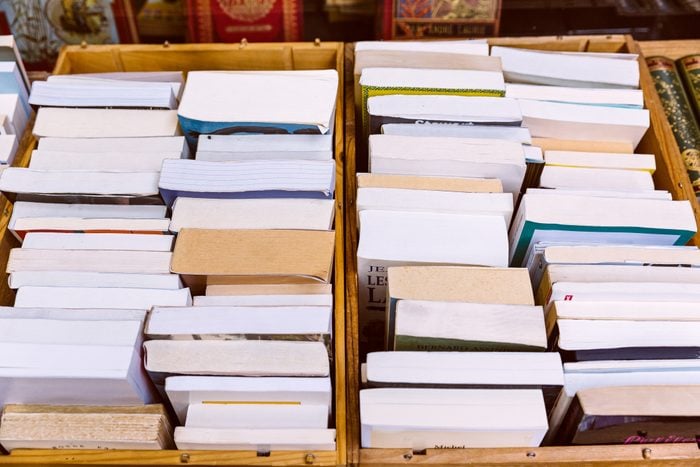
Where to donate books
Every reader knows that books can change lives. Children’s books shape our childhood. Self-help books inspire us in difficult times. Photo- or art-filled coffee table books double as home decoration and fill us with a sense of wonder. So it’s no surprise that parting with our favorite tomes can be a difficult task. But it can also be a win-win. Once you learn where to donate books, you can share their beauty, knowledge and wisdom with others.
If you’ve mustered up the courage to part with a portion of your home library, whether the best books you’ve ever read or classic books that have been collecting dust for ages, consider donating them instead of tossing them in the recycling bin. From the Salvation Army to Goodwill, the 14 places below accept book donations, used or unwanted. And in case you’re still wavering, consider this: Not only will donating books free up space on your bookshelf for new titles, but because you’re not tossing them in the trash, it’ll help the environment too.
Join the free Reader’s Digest Book Club for great reads, monthly discussions, author Q&As and a community of book lovers.
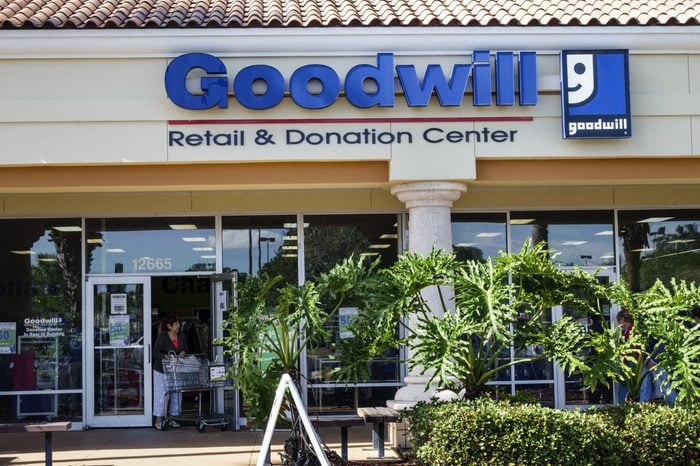
Goodwill
Accepted books: New or gently used paperbacks and hardbacks
Wondering where to donate books from a variety of genres? Head to your local Goodwill. The store accepts all types of books—as long as they are new or gently used—and proceeds go directly to Goodwill’s outreach programs. The company provides job training, employment placement services and other community-based programs for low-income families and individuals. With thrift stores located throughout the country, it’s a great organization to consider when donating your books and buying used goods.
How to donate
Bring your new or gently used books to a local donation center, which you can find on the Goodwill website.
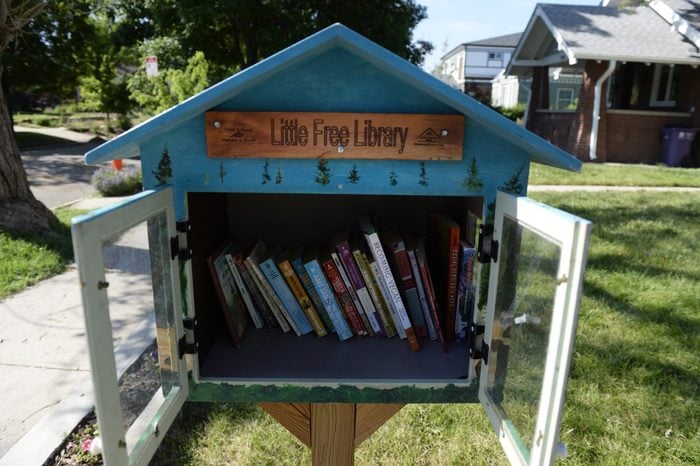
Little Free Diverse Libraries (Diverse Stories)
Accepted books: Diverse books
Maybe your kids have outgrown their favorite diverse children’s books. Or maybe you’re just making room on your shelf for more stories. Whatever your reason for sharing the literary love, we know just where to donate books written by and for people of color. Founded by a New York City school counselor and book lover in 2020, the nonprofit organization Diverse Stories is on a mission to amplify and empower diverse voices. Gather the books in your collection that center around Black or Brown characters or are written by Black or Brown authors, then leave them at Little Free Diverse Libraries in your area.
How to donate
Add books to a local Little Free Diverse Library, start your own diverse little library or mail books directly to Diverse Stories at 50 W. 72nd, Apt. 506, New York, NY 10023. Or you can donate money or buy new books for the organization.

Better World Books
Accepted books: Any
Better World Books is a for-profit global e-retailer that collects and sells new and used books online, matching each purchase with a book donation. Think of it this way: You donate a book, Better World Books sells it to a fellow bookworm and the sale helps fund literacy and education initiatives in the United States, in the United Kingdom and around the world. And talk about gifts that give back! This is a great place to buy gifts for your literary-minded pals—many of the books are in just-like-new condition.
How to donate
You can donate directly to drop boxes located in the United States and United Kingdom. If there isn’t one near you, you can send books to one of four addresses closest to your location. For more information, visit the Better World Books website.
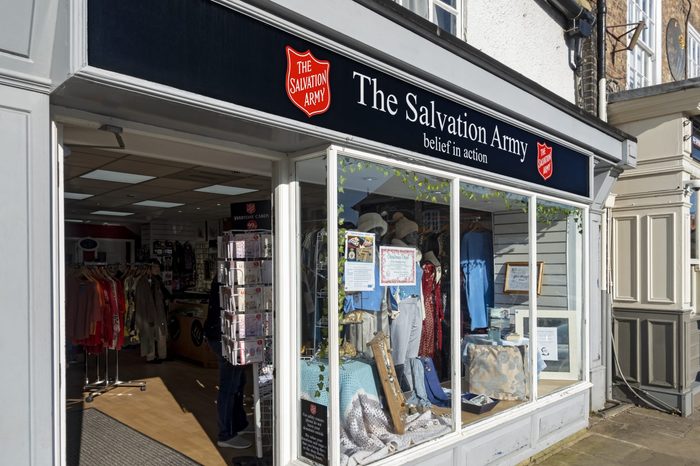
The Salvation Army
Accepted books: Paperbacks and hardbacks
Next time you’re debating where to buy and sell old, unwanted stuff—yes, including used books—consider the Salvation Army. It accepts pretty much any type of reading material, sending donations to both its stores (where they’ll be sold) and its homeless shelters. There are drop-off locations throughout the country, so you don’t need to mail the books.
How to donate
Bring your books to a Salvation Army drop-off location.
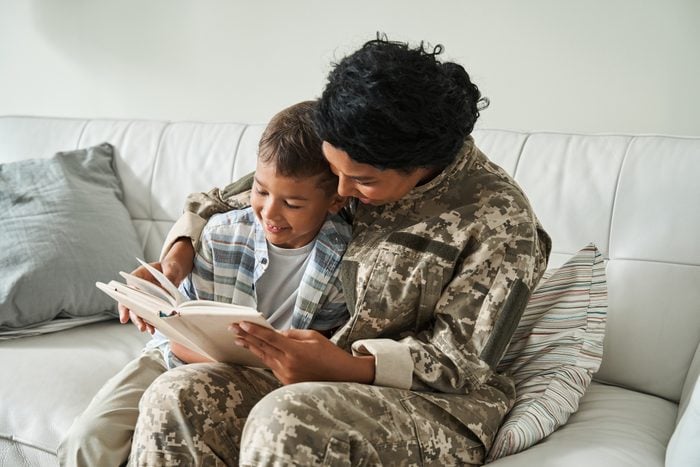
Operation Paperback
Accepted books: Requests only
A great way to honor and support our troops is to donate to Operation Paperback. This nonprofit started in 1999, kicking off its mission by sending its very first shipment of books to Kuwait and Saudi Arabia. As a volunteer shipper, you get access to the Volunteer’s Corner, your special hub where you can request the addresses of troops, veterans and military families. Plus, you can send a single shipment of books … or even several! Every bit makes a difference.
How to donate
Register for an Operation Paperback account. Once you’re set up, the system will generate a customized address list for you to send donations based on the book genre.

Prison Book Program
Accepted books: Needs vary, but the nonprofit lists requested categories on its website
The Prison Book Program has been bringing reading materials directly to incarcerated individuals since 1972. The Massachusetts-based organization distributes books to inmates throughout the country with the intention of encouraging and facilitating reading behind bars. It sent 63,602 books to prisoners in 2023 alone.
The most in-demand books, by far, are dictionaries—the organization sends out more than 3,500 per year. Thesauri, business books, drawing guides and coloring books, exercise books, fiction of all genres and religious works are also popular categories. Check the book donation guidelines before mailing the books.
How to donate
You can drop off your donation or mail your books via media mail to United First Parish Church in Quincy, Massachusetts.

Reader to Reader
Accepted books: Children’s and young adult books
Reader to Reader is dedicated to bringing books to under-resourced schools and public libraries across America, and its impact has been far-reaching. The program specifically benefits the nation’s poorest communities, from inner-city schools and Native American reservations to impoverished rural towns. By donating your books here, you’ll make a huge difference in America’s struggling communities. One note: Reader to Reader doesn’t accept textbooks, encyclopedias, magazines or out-of-date reference materials. But it does want children’s books suitable for grades pre-K through high school.
How to donate
Send boxes under 35 pounds directly to the organization. When your books are boxed and ready to go, contact Reader to Reader by emailing [email protected] or calling 413-256-8595.

Pajama Program
Accepted books: Brand-new and unused children’s and young adult books
Pajama Program supports children in unstable and uncertain living situations. This New York–based nonprofit generously donates books and pajamas to kids living in shelters, group homes and temporary housing facilities. Nightfall is the most vulnerable time for these children, but by donating books to Pajama Program, you can help them feel safe, important and loved.
Keep in mind: The organization accepts only brand-new or unused book donations that aren’t focused on violence, death, terminal or serious medical issues, religion, holidays or divorce. And don’t send any that use provocative language or images (such as curse words, tobacco, alcohol, drugs, sex and partying) or that focus on family roles (such as parents or siblings). Instead, send books suitable for children in grades pre-K through high school. Want to do even more good? Before you upcycle all your old clothes, set aside kids’ PJs and donate them with your books to Pajama Program.
How to donate
Complete the Pajama Program donation form. Upon receipt, someone from a local chapter or the national office will get in touch to coordinate the delivery of your donation to the appropriate location.
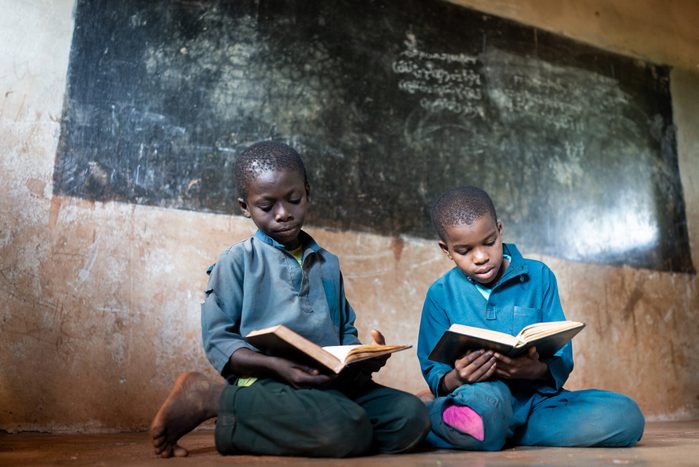
Books for Africa
Accepted books: Any
Books for Africa creates a culture of literacy and provides tools of empowerment for students, parents, teachers and community leaders in Africa. By donating used books to this nonprofit, you’re helping mobilize communities eager to gain an education. As the website declares, “When the books arrive, they go to those who need them most: children who are hungry to read, hungry to learn, hungry to explore the world in ways that only books make possible.” The organization spends 50 cents per book on shipping to Africa, so as you pack up your book donation, consider making a monetary donation as well.
How to donate
If you live in the area, you can drop books off at the St. Paul, Minnesota, or Marietta, Georgia, location. Otherwise, send your donation to the Books for Africa warehouse at 1491 Cobb Industrial Drive, Building B, Marietta, GA 30066. After dropping off or mailing in your books, send an email to [email protected]; the organization will send you a thank-you letter for your records.
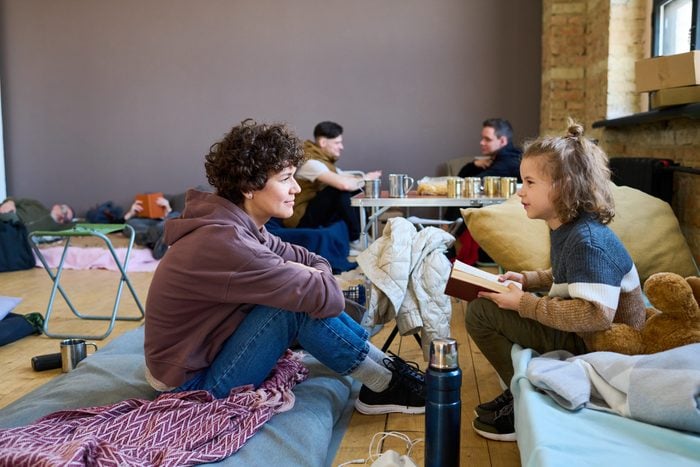
Project Night Night
Accepted books: Brand-new children’s books
Donate new books (for newborns and kids up to age 12) to Project Night Night, which benefits at-risk, homeless children under the age of 12. Each year, the charity sends more than 25,000 Night Night Packages to homeless shelters across America. Each package contains children’s books, stuffed animals and a security blanket, all wrapped in a canvas tote. The organization’s mission is to distribute these care packages to every homeless child in the country, promote education and provide comfort for children in stressful and uncertain living conditions.
You can donate books in a variety of children’s book genres, but avoid sending religious books, heavy books (like large, hardbound anthologies) and books with batteries. Don’t have books to donate? You can also order them from the organization’s Amazon wish list and send them directly.
How to donate
Send books to Jessica Bryan at Project Night Night (1026 Kensington Avenue, Grosse Pointe Park, MI 48230) or email [email protected] for California delivery instructions.
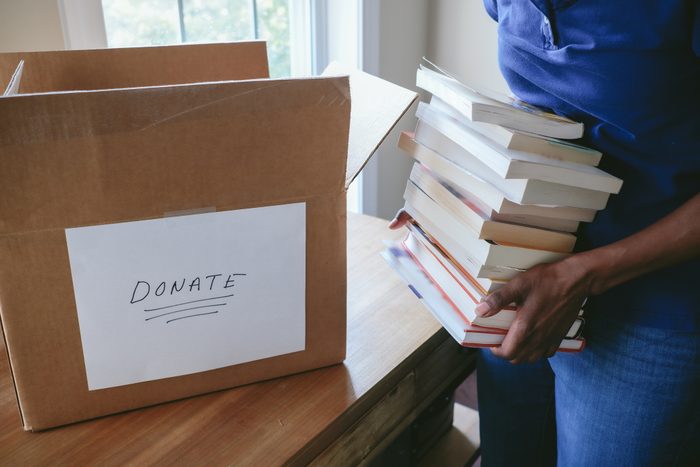
DonationTown
Accepted books: Any
Wondering where to donate books without having to pay for shipping? DonationTown is a great resource for placing your books and other household items in a worthy home, and it provides free book pickup and delivery. Once in hand, your book donations head to nearby charities, like the Humane Society, Hope Services and Rescue Mission. Your donation may also go to a school, county library, prison library or nursing home. In short, DonationTown knows which local places are in need of books and will take them off your hands to make sure they get there. And don’t stop with books. There are plenty of things in your home you probably didn’t know you could donate. Send them to DonationTown to give them a second life.
How to donate
Fill out the donation form with your ZIP code and personal information. DonationTown will direct you to an organization that can pick up your unwanted items.

Local schools
Accepted books: Age-appropriate books in good condition
Local schools are great places to rehouse your favorite books. Because stocking libraries and classrooms with books costs schools money, many welcome donations as long as books are age appropriate and in decent condition. Before you drop off a load, contact your local schools to find out what’s accepted and the best way to make the donation.
How to donate
Contact your local school for specifics.
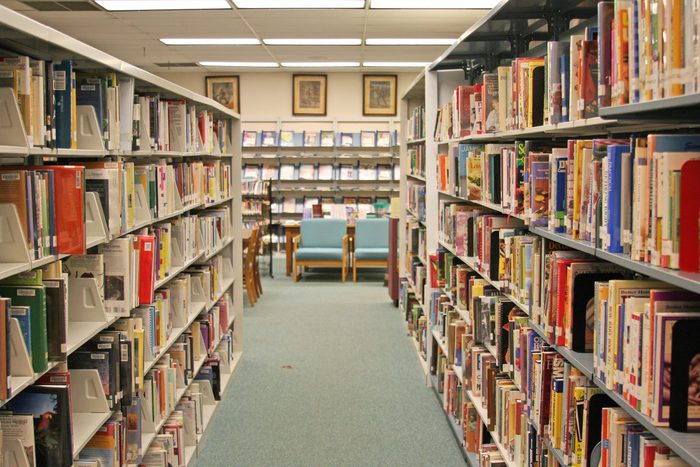
Libraries
Accepted books: Any
Still no idea where to donate books? Where better to send your unwanted books than a place that shelves thousands of them so people in the community can read for free? Generally, libraries will take all books, but check with your local library for details on specific needs. If they can’t use them on their shelves, they’ll usually sell the books to raise funds, donate them to various charities or recycle them.
How to donate
Visit your local library’s website for specific details on how and where to donate books, plus whether there are any restrictions on the books you can drop off. There might be limits on how many titles you can donate at once.

Secondhand bookstores
Accepted books: Needs vary, but books should be in good condition
You can sell books to secondhand bookstores, but if you don’t need the extra cash, consider making a donation instead. Used bookstores often need support, especially because many of them struggle to sell enough books to stay open. Some secondhand bookstores specialize in specific topics, such as science fiction, textbooks or children’s literature, and preferred genres differ from store to store. So check before donating.
How to donate
Check your local secondhand bookstore’s website for a list of book needs. If the information isn’t available on the website, contact the shop directly to ask about donations.
Additional research by Aubrey Almanza.
Get Reader’s Digest’s Read Up newsletter for more books, green living, humor, travel, tech and fun facts all week long.
Why trust us
At Reader’s Digest, we’re committed to producing high-quality content by writers with expertise and experience in their field in consultation with relevant, qualified experts. We rely on reputable primary sources, including government and professional organizations and academic institutions, as well as our writers’ personal experiences where appropriate. We verify all facts and data, back them with credible sourcing and revisit them over time to ensure they remain accurate and up to date. Read more about our team, our contributors and our editorial policies.
